
The Druze, who call themselves al-Muwaḥḥidūn, are an Arab and Arabic-speaking esoteric ethnoreligious group from West Asia who adhere to the Druze faith, an Abrahamic, monotheistic, syncretic, and ethnic religion whose main tenets assert the unity of God, reincarnation, and the eternity of the soul.

Damascus is the capital and largest city of Syria, the oldest current capital in the world and, according to some, the fourth holiest city in Islam. Known colloquially in Syria as aš-Šām (الشَّام) and dubbed, poetically, the "City of Jasmine", Damascus is a major cultural center of the Levant and the Arab world. Situated in southwestern Syria, Damascus is the center of a large metropolitan area. Nestled among the eastern foothills of the Anti-Lebanon mountain range 80 kilometres (50 mi) inland from the eastern shore of the Mediterranean on a plateau 680 metres (2,230 ft) above sea level, Damascus experiences an arid climate because of the rain shadow effect. The Barada River flows through Damascus.
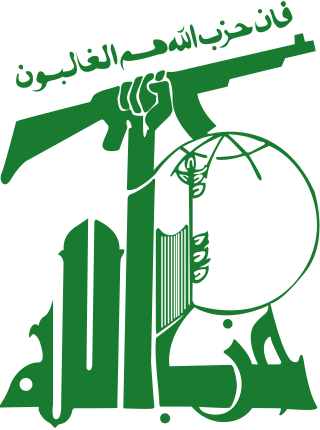
Hezbollah is a Lebanese Shia Islamist political party and paramilitary group, led since 1992 by its Secretary-General Hassan Nasrallah. Hezbollah's paramilitary wing is the Jihad Council, and its political wing is the Loyalty to the Resistance Bloc party in the Lebanese Parliament. Its armed strength is assessed to be equivalent to that of a medium-sized army.
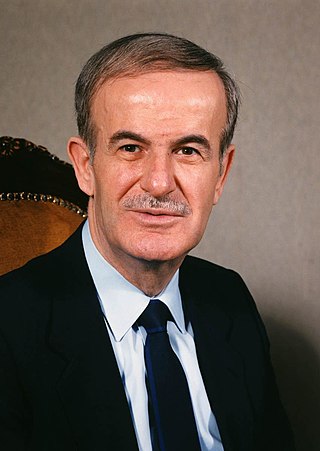
Hafez al-Assad was a Syrian statesman, military officer and revolutionary who served as the 18th president of Syria from 1971 until his death in 2000. He had previously served as prime minister of Syria from 1970 to 1971 as well as regional secretary of the regional command of the Syrian regional branch of the Arab Socialist Ba'ath Party and secretary general of the National Command of the Ba'ath Party from 1970 to 2000. Hafez al-Assad was a key participant in the 1963 Syrian coup d'état, which brought the Syrian regional branch of the Arab Socialist Ba'ath Party to power in the country.
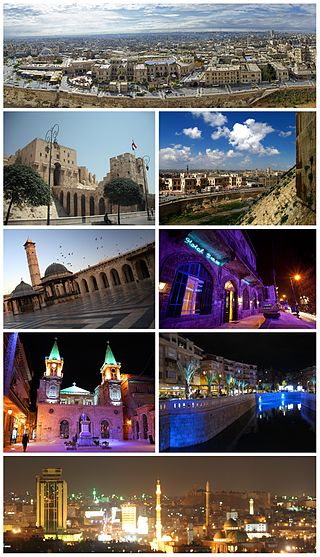
Aleppo is a city in Syria, which serves as the capital of the Aleppo Governorate, the most populous governorate of Syria. With an estimated population of 2,098,000 residents as of 2021, it was Syria's largest city until its population was surpassed by Damascus, the capital of Syria, the largest in Syria's northern governorates and also one of the largest cities in the Levant region.

Bashar al-Assad is a Syrian politician who is the current and 19th president of Syria since 17 July 2000. In addition, he is the commander-in-chief of the Syrian Armed Forces and the secretary-general of the Central Command of the Arab Socialist Ba'ath Party, which nominally espouses a neo-Ba'athist ideology. His father and predecessor was General Hafiz al-Assad, whose presidency in 1971–2000 marked the transfiguration of Syria from a republican state into a de facto dynastic dictatorship, tightly controlled by an Alawite-dominated elite composed of the armed forces and the Mukhabarat, who are loyal to the al-Assad family.

The Alawites, also known as Nusayrites, are an Arab ethnoreligious group that live primarily in the Levant and follow Alawism, a religious sect that splintered from early Shi'ism as a ghulat branch during the ninth century. Alawites venerate Ali ibn Abi Talib, revered as the first Imam in the Twelver school, as the physical manifestation of God. The group was founded by Ibn Nusayr during the 9th century. Ibn Nusayr was a disciple of the tenth Twelver Imam, Ali al-Hadi and of the eleventh Twelver Imam, Hasan al-Askari. For this reason, Alawites are also called Nusayris.

Syria, officially the Syrian Arab Republic, is a country in West Asia located in the Eastern Mediterranean and the Levant. It is bounded by the Mediterranean Sea to the west, Turkey to the north, Iraq to the east and southeast, Jordan to the south, and Israel and Lebanon to the southwest. It is a republic that consists of 14 governorates as subdivisions. A country of fertile plains, high mountains, and deserts, Syria is home to diverse ethnic and religious groups, including the Arabs, Assyrians, Armenians, Circassians, Greeks, Armenians, Turkmens, Kurds, Albanians, and Chechens. Religious groups include Muslims, Christians, Alawites, Jews, and Druze. The capital and largest city is Damascus. Arabs are the largest ethnic group, and Sunni Muslims are the largest religious group. Syria is now the only country that is governed by Ba'athists, who advocate Arab socialism and Arab nationalism.
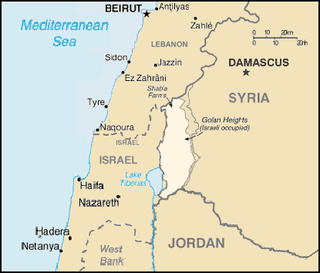
The Golan Heights, or simply the Golan, is a basaltic plateau, at the southwest corner of Syria. It is bordered by the Yarmouk River in the south, the Sea of Galilee and Hula Valley in the west, the Anti-Lebanon mountains with Mount Hermon in the north and Wadi Raqqad in the east. Two thirds of the area has been occupied by Israel following the 1967 Six-Day War and then effectively annexed in 1981 – an action unrecognized by the international community, which continues to consider it Israeli-occupied Syrian territory.

The Islamic State (IS), also known as the Islamic State of Iraq and the Levant (ISIL), the Islamic State of Iraq and Syria (ISIS) and by its Arabic acronym Daesh, is a transnational Salafi jihadist group and an unrecognised quasi-state. Its origins were in the Jai'sh al-Taifa al-Mansurah organization founded by Abu Omar al-Baghdadi in 2004. The organization affiliated itself with Al-Qaeda, so IS was originally a branch of Al-Qaeda and fought alongside them during the Iraqi insurgency. IS eventually split, and gained global prominence in 2014, when its militants successfully captured large territories in northwestern Iraq and eastern Syria, taking advantage of the ongoing Syrian civil war. Notorious for its perpetration of war crimes and countless human rights violations, IS has engaged in the persecution of Christians, Mandaeans, Shia Muslims, and Sufi Sunnis, and published videos of its beheadings and executions of journalists and aid workers. By the end of 2015, it ruled an area with an estimated population of 12 million people, where it enforced its extremist interpretation of Islamic law, managed an annual budget exceeding US$1 billion, and commanded more than 30,000 fighters.

The al-Assad family, also known as the Assad dynasty, is a Syrian political family that has ruled Syria since Hafez al-Assad became president of Syria in 1971 under the Ba'ath Party. After his death, in June 2000, he was succeeded by his son Bashar al-Assad.

The Syrian civil war is an ongoing multi-sided conflict in Syria involving various state-sponsored and non-state actors. In March 2011, popular discontent with the rule of Bashar al-Assad triggered large-scale protests and pro-democracy rallies across Syria, as part of the wider Arab Spring protests in the region. After months of crackdown by the government's security apparatus, various armed rebel groups such as the Free Syrian Army began forming across the country, marking the beginning of the Syrian insurgency. By mid-2012, the crisis had escalated into a full-blown civil war.

The Free Syrian Army is a big-tent coalition of decentralized Syrian opposition rebel groups in the Syrian civil war founded on 29 July 2011 by Colonel Riad al-Asaad and six officers who defected from the Syrian Armed Forces. The officers announced that the immediate priority of the Free Syrian Army was to safeguard the lives of protestors and civilians from the deadly crackdown by Bashar al-Assad's security apparatus; with the ultimate goal of accomplishing the objectives of the Syrian revolution, namely, the end to the decades-long reign of the ruling al-Assad family. In late 2011, the FSA was the main Syrian military defectors group. Initially a formal military organization at its founding, its original command structure dissipated by 2016, and the FSA identity has since been used by various Syrian opposition groups.
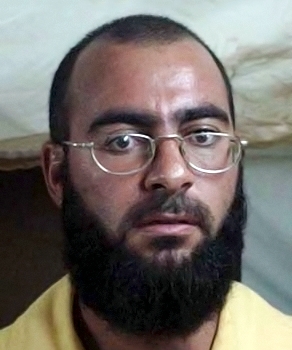
Ibrahim Awad Ibrahim Ali al-Badri, commonly known by his nom de guerreAbu Bakr al-Baghdadi, was an Iraqi militant who was the first caliph of the Islamic State (IS) from 2014 until his death in 2019.

The Syrian opposition is the political structure represented by the Syrian National Coalition and associated Syrian anti-Assad groups with certain territorial control as an alternative Syrian government.

Al-Nusra Front, also known as Front for the Conquest of the Levant, was a Salafi jihadist organization fighting against Syrian government forces in the Syrian Civil War. Its aim was to overthrow president Bashar al-Assad and establish an Islamic state ruled by Sharia law in Syria.

On 22 September 2014, the United States officially intervened in the Syrian civil war with the stated aim of fighting the terrorist organization ISIS in support of the international war against it, code named Operation Inherent Resolve. The US currently continues to support the Syrian rebels and the Kurdish-led Syrian Democratic Forces opposed to both the Islamic State and Syrian president Bashar al-Assad.

The Syrian Democratic Forces (SDF) is a Kurdish-led coalition formed by ethnic militias and rebel groups, and serves as the official military wing of the Autonomous Administration of North and East Syria (AANES). The SDF is allied to and supplied by the United States–led CJTF–OIR international alliance. Founded in 10 October 2015, the SDF claims that its mission is fighting to create a secular, democratic and federalized Syria. The SDF is opposed by Turkey, who claims the group has direct links to the PKK, which it recognizes as a terrorist group.

Hay'at Tahrir al-Sham, commonly referred to as Tahrir al-Sham, is a Sunni Islamist political and armed organisation involved in the Syrian Civil War. It was formed on 28 January 2017 as a merger between Jaysh al-Ahrar, Jabhat Fateh al-Sham (JFS), Ansar al-Din Front, Jaysh al-Sunna, Liwa al-Haqq, and Nour al-Din al-Zenki Movement. The unification process was held under the initiative of Abu Jaber Shaykh, an Islamist commander who had been the second Emir of Ahrar al-Sham.



















